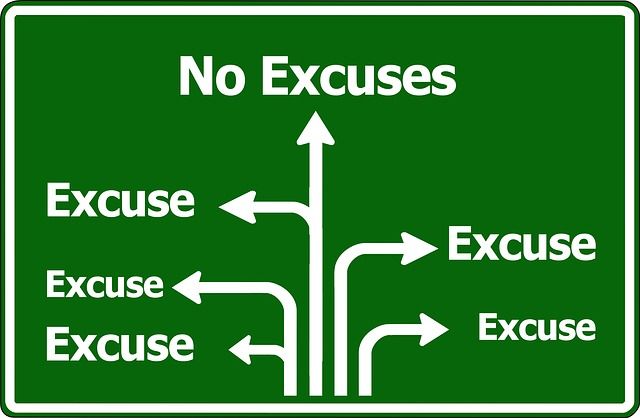
The first thing that you will notice as you set out after your goals this year, is that not everything will go perfectly all of the time.
Excuses are not Reasons!
The first thing that you will notice as you set out after your goals this year, is that not everything will go perfectly all of the time. It sounds so trite to make such an obvious statement but it needs to be said because despite all of us “knowing” this intellectually, at the first sign of a problem or difficulty of any sort (lets call them “the normal trials of life”), we seem to forget that these ARE normal.
If you could just accept right now, that there WILL be all manner of small and large issues that will conspire to test you, then working through them will seem so much easier.
In the middle of last year I spotted a great article which deals with this subject beautifully and I have been waiting for the right time to show it. It seems now is that time.
I found it on the Maverick Spirit web site created by Wayne Mansfield. Wayne runs “Business Seminars Australia” - Excellence in Business Education, in Perth Western Australia. He can be contacted at Email: wayne.mansfield@gmail.com or www.au1865.com. Alternatively Phone (+61 8) 9221 0922, Fax: (+61 8) 9221 0933 or http://www.linkedin.com/in/waynemansfield
An excuse is not a reason – August 24th 2007.
I have found myself facing a new series of challenges and seeking to explain (all right, make excuses ) to those people and companies that we aren't doing everything we have promised to do. I came across a great article by James Dale in his stimulating book “The Obvious” that seems to put things into perspective for me.
So, next time you feel like making an excuse, have a quick read of this great advice, and you should know what to do.
No one really wants to hear about why you didn't do what you said you do - didn't close the deal, win the contract, ship on time, make projections, get to the meeting, return the call or email, pass inspection, lower loss ratios, retain your client, increase the dividend, or acquire a company instead of being acquired.
In fact, the only thing worse than not doing what you said you'd do, is relying on excuses to rationalize what happened ... or didn't. No matter what you say, it always ends up sounding like, "My dog ate my homework."
Excuses that don't cut it:
- The unders: Under-staffed, under-financed, under stocked.
- The overs: Over-worked, over-leveraged, over-priced.
- The bads: Bad vendors, bad PR, bad boss. Bad client, bad morale, bad debts, bad advice - tax, legal.
- The nos: No budget controls, no business plan, no contingency plan.
- The changes: Competition changed, market changed, economy changed.
- The personals: Flat tire, broken alarm clock, lost calendar, leaky pen, tooth/stomach/head - ache.
- The moderns: Server crashed, computer virus, corrupted files, spyware, spam, jammed ink jet, bad mobile service, Courier lost package, GPS/Palm Pilot/Blackberry malfunction.
None of these is a reason for coming up short.
They’re all just business facts of life. Companies are always under or over-staffed; finances are tight, or should be in a well-run company; prices are higher than some competitors, lower than others; expenses need to be controlled, inventory managed, clients retained, advice re-assessed, PR improved, and morale boosted.
Competition is a given; markets change; economies go up and down and up again.
Modern excuses are just digital versions of old ones. My chariot driver got lost or my GPS was wrong – same excuse, different century, both weak.
Those things can and should be addressed. Otherwise, they’re excuses for failure – unacceptable excuses.
Real Reasons:
- There are no good excuses for business setbacks, but there are reasons. They don't occur often. There are only three:
Priority - Sometimes we have to make choices. You have a shortage of goods and have to choose satisfying one client or another. Do you attend the meeting with the boss or the one with the client? (Meet the client and the boss should understand.) Do you cut profit to win a contract or price realistically and lose the contract? Do you choose a family need or a business need? (You know which ones really matter.). - Marketplace realities - There are instances - a few - in which meaningful changes do affect business. Competition opts to lose money on contracts to gain market share. The economy goes into actual recession and everyone suffers. The government alters the business environment - interest rates, tax rulings, or new laws. ACCC and ASIC legislation cost companies millions filling out compliance documents to prevent fraudulent business practices even in squeaky clean companies.
- Disaster - death and natural catastrophe. These happen, rarely, but they do happen. And they require no explanation.
When things go wrong, address what went wrong - candidly and swiftly. The people who do best don't use excuses. They overcome problems.
That's it for today, until next time, continue to enjoy being a free spirit in a complicated world... Wayne Mansfield.